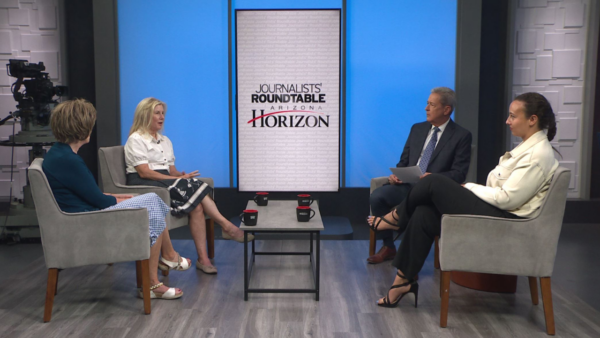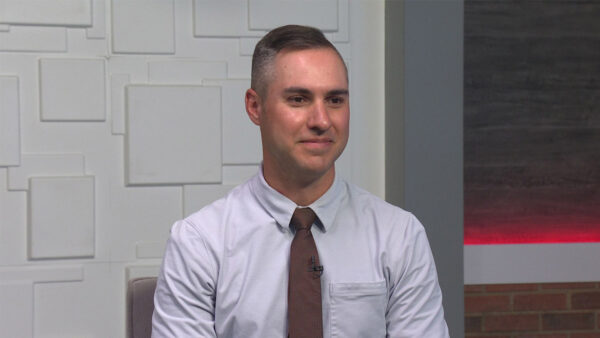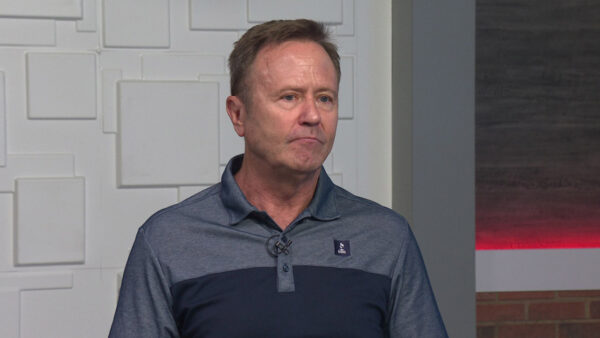Rick Romley, who served as Maricopa County Attorney from 1988-2004, and Robert Ashby, the first black pilot to fly for a commercial airline, talk about how their experience in the armed forces shaped their lives, careers and accomplishments after military service.
Ted Simons: Good evening and welcome to "Horizon." I'm Ted Simons. Former Maricopa County attorney Rick Romley had a distinguished military career. He retired from the marine corps after suffering severe combat wounds in Vietnam. But his injuries didn't stop him. Besides becoming county attorney, he also ran a retail business, was a founding member of a partnership for a drug-free America, and was named the national disabled veteran of the year by disabled American veterans. Robert Ashby served proudly in the military as one of the original Tuskegee airmen. He also distinguished himself in life later after the military. He was the first African-American pilot to fly a commercial airline and he's traveled the world, helping to raise over $2 million in scholarship funds. Both Romley and Ashby were named to the Arizona veterans hall of fame society for their achievements after their military service. Here now are Rick Romley and Robert Ashby. Good to have you both on "Horizon." That you so much for joining us.
Both: Great to be here.
Ted Simons: Bob, let's start with you. Let's get personal here. Why did you go into the military?
Robert Ashby: Well, World War II came about and we had to make a decision. You were either drafted and assigned wherever the service felt they needed, or you can select where you wanted to go and after viewing all of the possibilities and so forth, and the air force, you fly on a mission and at the end of the mission, you come back to a bed. So it was a no-brainer for me. [Laughter]
Ted Simons: Rick, let's go to you. What about your decision?
Rick Romley: I can't top that one. I was relatively young. Starting out and I was going to Phoenix college and in my first semester and I was so unfocused and I realized it and one of my very good friends, Thomas Shafer, who I grew up with in the valley, he was not as focused as well as he should have been and we decided, let's take a couple of years and go into the military and even though Vietnam was going on, I -- I don't think we recognized the seriousness of that decision and we chose the marine core.
Ted Simons: When you were a kid, did you play army or think -- when you were a kid, did you think army, firefighter, army?
Rick Romley: Yeah, I mean, it was wearing a white hat and I do believe the military, to this day, they -- they are -- they are selfless in their service to this country. And I guess I wanted to wear that white hat a little bit.
Ted Simons: Bob, how about you? When you were a kid, did this occur to you that this was an option or did it gradually come into view?
Robert Ashby: No, it was nothing I even thought about. I would see a plane flying overhead or in the movies, because I had no -- you know, contact with anything of this type. Never been near an airplane. But I determined that, hell, if anyone else can fly, I can fly. So I elected to go and fly.
Ted Simons: What about reaction from family?
Robert Ashby: My mother supported me and everyone supported me really well.
Ted Simons: No one saying you're nuts, don't do this?
Robert Ashby: No, they felt I was mature enough with what I was going on in my life at that time, they felt I made a good decision.
Ted Simons: What about your family, Rick?
Rick Romley: They were very much opposed. Very worried about Vietnam. The news media, although it had been there, they thought it was a very, very bad decision.
Ted Simons: When you went in, did you see yourself spending a long time? Did you see yourself maybe having a military career?
Rick Romley: I thought it was a possibility. But I was -- I think that during boot camp, I was offered officer candidate school because I did real well on the tests and those things. And I went in as enlisted and they told me I had to make a commitment for five years and I chose not to so I guess I didn't look at it as long term.
Ted Simons: How about you?
Robert Ashby: When I went in, the war was going on and I thought this was going to be something just primarily during the war and that was it. But I got to love flying so much and after the war, and I was given the opportunity of having a career in the service, I elected to stay in and have a full career.
Ted Simons: Interesting. Let's talk about individual -- what happened during your military service. Rick, I want to get to you in a second here. You experienced obviously racism in the military. It was inbred in the time you were serving. How glaring was it and how did it change over time?
Ted Simons: Well, it was very glaring at that time. All of our training, the Tuskegee airmen were trained at one base. In concept, a black base but the commander of the base had to be white and the instructors, being we did not have black pilots previous to this, the instructors teaching us to fly were white also. Those fellows were ok. The base commander -- and it seemed like this went on for sometime throughout the military during the '40s, they were so concerned with the segregation, on this black base we had separate drinking fountains.
Ted Simons: Mm.
Robert Ashby: We had separate eating facilities and this got to be such a boiling point, that finally, they got rid of the commander we had and they brought in a commander who I considered an outstanding individual and he came in, changed everything, made it a base that everyone cooperated and did everything together.
Ted Simons: But it was still an all-black base?
Robert Ashby: It was still an all-black base.
Ted Simons: The idea of taking orders from white military superiors, that had to rankle a little bit.
Robert Ashby: It did, but we realized we didn't have anybody in that rank category. We were trying to move up to that status because we were kept down so long and so this evolved gradually that we got fellows with promotions and everything that they assumed command responsibility.
Ted Simons: Rick, your military experience includes some serious injuries. Talk to us about what happened, as well as you can and as much as you want to and the recovery process. I want to know about the physical and the mental too.
Rick Romley: I was in the infantry. I was a squad leader and it was April 7th, 1969, I got wounded. And we were doing a sweep right out of DA NANG, because it had been rocketed regularly and compromising the operations out of the airport. And I had a reinforced squad and it had gone well and then the day changed dramatically and we hit a bad area and I lost six of my men and one died in my arms and I stepped on a land mine and it changed my life dramatically, and the results were significant. I mean, I -- I eventually lost both legs above the knee. Hit in the right arm with major damage and in the abdomen and I was in the hospital for a year and got gangrene. And it was a very, very difficult time. But not just physically. Physically, at the very beginning, but mentally, it is probably a little more difficult. I'll never forget, Ted, I finally got back to the states and I had to stay in the Philippines and then Japan and got me back to the states, because I was so bad. But when I got to Balboa naval hospital, my sister eventually came, I overheard her say outside the door -- I was very skinny, like a concentration camp survivor and I heard her talking, what is he going to do? Sell pencils on the street corner? It was an awakening for me but got my back up some. And I talked to a lot of veterans, combat wounded veterans nowadays and tried to talk to them about the psychological side but I'm a very firm believer that, in a way, this won't make any sense to you, I know it won't, but I'm stronger because of my war injuries, it made me focus in my life. I know I have a strength inside of me, so when difficult times come about, I know I can handle it. And you know, I think I'm a better person from it. As crazy as that sounds.
Ted Simons: It sounds crazy, but the way you put it, I mean, you have experienced something that made you what you are. And Bob, I want to ask you, as well. The military, maybe not in that kind of a dramatic fashion, but the military made you what you are. Did you find yourself after military service looking at the world differently? Looking at the rest of us in the workaday world differently? Did you find yourself -- do you still find yourself a military person?
Robert Ashby: Yes, I do. Because the military instilled certain traits in you that you carry on throughout your life. And timing is one. And my wife, she made reference to that quite often, but all of my life has been timing. Flight, you take off at a time, you're at a target at a time. Every place you're assigned to go, there's a time for it. Commercial aviation, you take off and land on time. Timing really took over my life. And -- timing really took over my life and I appreciate it.
Ted Simons: Rick, when you returned with the injuries, with the rehabilitation and all of that entailed, you are still a military guy and even now, you're still a military guy.
Rick Romley: Very much so. I -- there's a self-discipline that comes with being in the military. Timing. A way you do your life. I get up early in the morning. I don't use alarm clock. Probably the best example of me being able to show my military with me, I raised my two boys on my own. And boy, every Saturday, we'd get up. We had certain chores, there's a regimented schedule we'd have to do and they tease about it today. But both of my boys, even though I was so severely wounded they both joined the marine corps as well. Which surprised me. Because they saw what war can do. They saw providing that service to a country can be difficult. But I think that -- I mean, I like to think, I would like to think that my children saw something in me that made them say, I want that characteristic. I want that trait in me and so they joined the service.
Ted Simons: Yeah, gentlemen we're just about out of time. Quickly, yes or no. Would you do it over again?
Robert Ashby: Yes.
Ted Simons: Even with the discrimination, the whole nine yards?
Robert Ashby: Yes, I would do it again.
Ted Simons: Rick, how about you?
Rick Romley: Yes, absolutely. Even with the injuries.
Ted Simons: Even with the injuries?
Rick Romley: Yes, I like myself. I believe -- I believe in service. I think that's -- that adds meaning to your life.
Ted Simons: Gentlemen, it's been a honor and pleasure to have you both on the program.
Robert Ashby: Thank you.
Rick Romley: Thank you.
Rick Romley: Arizona veteran and Maricopa County Attorney, 1988-2004;Robert Ashby:Arizona veteran and the first black pilot to fly for a commercial airline;























